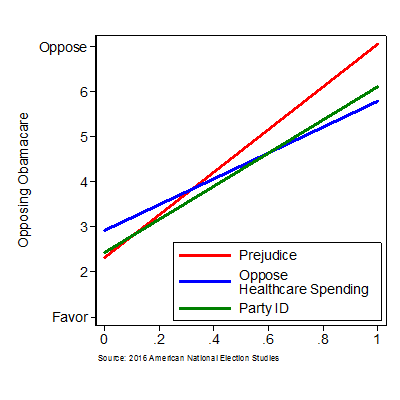Since being legislated in 2010, the Affordable Care Act, also known as “Obamacare,” has been a polarizing policy across partisan and ideological lines. Polls showed that a majority of American public opinion was against the law until the beginning of 2017. The trend reversed after Donald J. Trump’s presidency. According to the most recent data by Economist/YouGov (August 18, 2017 – August 21, 2017), half of the American public favors Obamacare whereas 43 percent opposes it. Despite the increase in support, opposition against the law is still persistent among the American people. What explains this negative attitude toward Obamacare?
Scholars identify racial prejudice as a major explanation for opposition against the law. Michael Tesler of UC Irvine shows that racial attitudes shaped health care opinions strongly after Barack Obama’s election in 2008: Healthcare attitudes are now significantly racialized. How people feel about racial minorities strongly influences people’s attitudes toward Obama. Racially prejudiced people oppose Obamacare.

Is this the only explanation that might shape attitudes toward Obamacare? Isn’t it possible that some may oppose to the law based on their attitudes about healthcare spending? Or, can they be following their party identification? At the end of the day, Obamacare is a law legislated by Democrats. So, Republicans may oppose it based on partisanship.
I tested these three arguments – prejudice, spending principles, and party identification – using the 2016 American National Election Studies– a nationally representative scientific survey that has been conducted since 1948. I constructed a prejudice measure using attitudes toward blacks, Latinos, Asians, feminists, homosexuals, Muslims, Jews, transgendered people, and illegal immigrants. Principled opposition against healthcare spending is measured as a 7-category variable ranging from “increase a great deal” to “decrease a great deal.” Party identification is measured as a 7-category variable ranging from strong Democrats to strong Republicans.
The model includes these three variables, and it controls for the race of respondents. The findings are in figure 1. There are two major observations:
First, prejudice toward minorities predicts opposition to Obamacare stronger than a principled stand on spending and party identification. In other words, earlier findings by scholars like Tesler find empirical support in 2016 as well.
Second, principled opposition against healthcare spending and party identification also explain why people do not like Obamacare. However, their explanatory power is still lower than that of dislike toward racial, religious, ethnic, and cultural minorities.
Obamacare is still racialized. There is some dislike toward it based on principles and politics. However, the opposition is mostly explained by prejudice that has been on the rise since the election of Barack Obama in 2008.
Kerem Ozan Kalkan is an assistant professor of political science in the Department of Government and Economics at Eastern Kentucky University.
